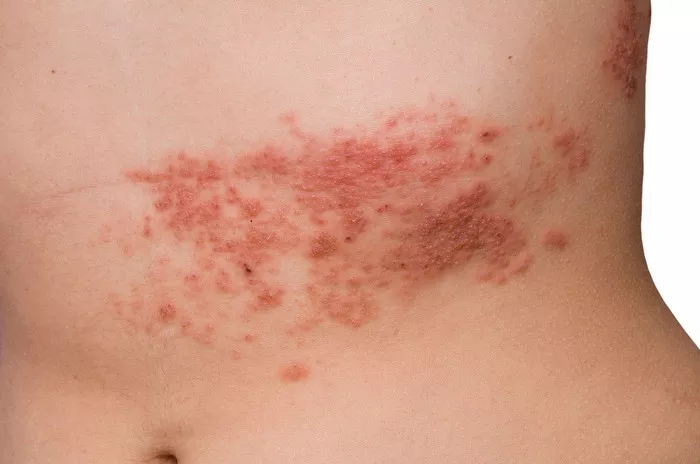Shingles, a condition caused by the reactivation of the varicella-zoster virus (the same virus that causes chickenpox), affects many people, particularly those over the age of 50. The reactivation of this virus results in a painful rash and blisters, most often on one side of the body. One of the most important aspects of understanding shingles is recognizing that it is different from herpes, despite both being caused by similar types of viruses.
Herpes simplex virus (HSV), on the other hand, causes conditions like cold sores and genital herpes. These viruses are distinct from varicella-zoster, but they share some similarities. This article will explain how the vaccine Shingrix works in relation to herpes and whether it offers any protection against herpes simplex virus infections.
What is Shingrix?
Shingrix is a vaccine developed to prevent shingles, a painful condition that occurs when the varicella-zoster virus reactivates in the body. The vaccine is designed for adults aged 50 and older, as older adults are more likely to experience shingles and the complications that come with it, such as postherpetic neuralgia (PHN), which causes chronic pain long after the rash has healed.
Shingrix is a non-live vaccine, meaning it does not contain the virus itself but rather stimulates the immune system to produce a response against it. It is made using recombinant technology, which means it contains a protein from the varicella-zoster virus to help the body recognize and fight the virus if it reactivates.
This vaccine is highly effective in preventing shingles and has been shown to offer strong protection for adults aged 50 and older. It requires two doses, typically administered 2 to 6 months apart, and the protection lasts for several years.
What is Herpes?
The term “herpes” commonly refers to two different types of herpes simplex virus: HSV-1 and HSV-2. Both of these viruses can cause infections in different areas of the body.
Herpes Simplex Virus Type 1 (HSV-1): This type of virus most commonly causes cold sores around the mouth but can also affect other areas of the face or body. HSV-1 is contagious and can spread through direct contact with an infected person’s skin or saliva.
Herpes Simplex Virus Type 2 (HSV-2): This type primarily causes genital herpes, a sexually transmitted infection (STI). It is spread through sexual contact with someone who is infected, even if they don’t show visible symptoms.
While both herpes viruses cause lifelong infections, the body’s immune system usually keeps them under control. However, the viruses can become active again if the immune system weakens due to stress, illness, or other factors.
Is There a Link Between Shingrix and Herpes?
It is important to understand that Shingrix and herpes simplex virus (HSV) are related in the sense that they both involve viruses from the same family of viruses, called Herpesviridae. However, they are not the same virus. Shingrix is specifically a vaccine aimed at preventing shingles, which is caused by the varicella-zoster virus (VZV).
Herpes simplex virus (HSV) and varicella-zoster virus (VZV) are both in the Herpesviridae family, but they are different viruses with distinct effects on the body. Shingrix works to protect against shingles, but it does not provide any protection against HSV infections, such as cold sores or genital herpes.
Does Shingrix Help with Herpes Simplex Virus?
No, Shingrix does not help with herpes simplex virus (HSV). Shingrix is specifically designed to prevent shingles caused by the reactivation of the varicella-zoster virus, not the herpes simplex virus. While both shingles and herpes simplex infections share similarities (like being caused by viruses in the Herpesviridae family), they are fundamentally different conditions that require different approaches to prevention and treatment.
If you are looking for protection against herpes simplex virus (HSV), such as cold sores or genital herpes, Shingrix will not be effective. HSV requires its own targeted antiviral treatments and vaccines, but currently, there is no vaccine for HSV available to the public, though researchers are working on potential options.
Why Does Shingrix Not Protect Against Herpes Simplex?
Shingrix was developed to stimulate an immune response to varicella-zoster virus, not herpes simplex virus. The immune system responses elicited by Shingrix are specific to varicella-zoster, which is why the vaccine does not affect the immune response to herpes simplex.
Both varicella-zoster and herpes simplex viruses belong to the Herpesviridae family, but they are different viruses with unique characteristics. The immune system recognizes each virus separately, and vaccines must be designed to target the specific properties of each virus.
Shingrix works by boosting the body’s ability to fight off the varicella-zoster virus if it reactivates, but it does not address herpes simplex virus (HSV) infections, which require a separate immune response.
How Does Shingrix Help Prevent Shingles?
Shingrix helps prevent shingles by stimulating the immune system to produce a strong defense against the varicella-zoster virus. The vaccine contains a protein from the virus, which triggers the body’s immune system to recognize and attack the virus if it reactivates in the future.
When the varicella-zoster virus reactivates, it travels along nerve pathways to the skin, where it causes the characteristic rash and blisters associated with shingles. Shingrix helps prevent this reactivation by strengthening the immune system, reducing the risk of shingles and its associated complications, such as postherpetic neuralgia (PHN), a condition where nerve pain continues after the rash heals.
The vaccine has been shown to be highly effective in preventing shingles, with studies demonstrating that Shingrix reduces the risk of shingles by more than 90% in older adults. This makes it the preferred vaccine for preventing shingles, especially in those at higher risk due to age or weakened immune systems.
Shingrix and Other Herpes Infections
While Shingrix is not intended to treat or prevent herpes simplex virus infections, it is still important to be aware of the potential interactions between the herpes simplex virus and the varicella-zoster virus. Both viruses can cause significant discomfort, but they are managed differently.
People with herpes simplex virus infections, such as cold sores, may experience flare-ups when their immune systems are compromised. This can include times when they are undergoing stress, illness, or taking medications that weaken the immune system. Shingrix may indirectly help by boosting overall immune function, but it will not directly treat or prevent HSV outbreaks.
Treatment for Herpes Simplex Virus Infections
Currently, there are no vaccines available for herpes simplex virus, but antiviral medications can help manage and treat the symptoms of HSV infections. Medications such as acyclovir, valacyclovir, and famciclovir are commonly prescribed to reduce the severity and frequency of outbreaks. These medications help to shorten the duration of symptoms, reduce pain, and prevent the virus from spreading to others.
For people who experience frequent outbreaks, daily antiviral medications may be recommended to reduce the frequency of flare-ups and minimize the risk of transmission.
Conclusion
Shingrix is a vaccine specifically designed to prevent shingles, which is caused by the varicella-zoster virus, not herpes simplex virus. While both viruses belong to the Herpesviridae family, they are distinct and require different treatments and vaccines. Shingrix does not provide any protection against herpes simplex virus infections, such as cold sores or genital herpes.
If you are looking for protection against herpes simplex, you will need to focus on other treatment options, including antiviral medications that can help manage outbreaks. Shingrix remains an effective and important tool in preventing shingles, especially in older adults, but it does not address herpes simplex virus infections.
Related topics:

























